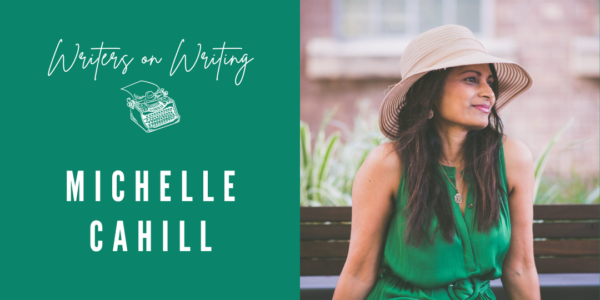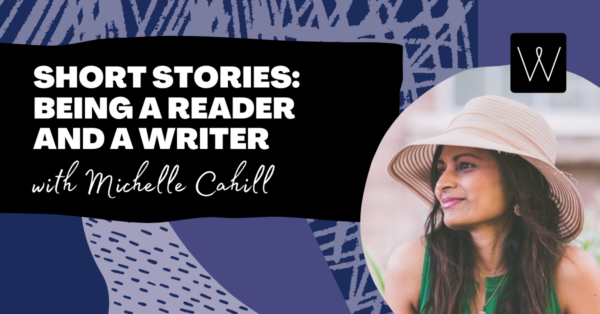
Writers on Writing is our regular conversation with a writer or industry professional about the writing craft, industry insights, and their own practice. This week, we spoke to award-winning author Michelle Cahill about how studying and writing short stories can be a rewarding experience and enhance your fiction writing skills.
Can reading short fiction make you a better writer of fiction?
It depends on whether you are reading for pleasure and enjoyment, or reading with a more critical lens, analysing how the writer is using language elements to create different effects: such as suspense, tone, intimacy, depth of feeling, dystopian alienation or haunting. Reading a story in this way for discussion helps us to consider and better understand how the writing is working effectively to absorb the reader, to hold their attention and to create a rich reading experience. How does the story move through the visual and narrative realms of storytelling to making us consider deeper things? It might be relationships, it might be gender or control or power or loss or trauma, or it might be storytelling itself.
Reading short fiction by masterful writers can also be inspiring and encourage us to try out their approaches.
Your workshop will look at contemporary short stories by SJ Norman and Lauren Groff; what makes these writers stand out to you?
Goff and Norman are both strong, brilliant, award-winning short story writers working at the height of their form and challenging conventional realist tropes. They each have a distinctive style. I’ve chosen them because we can learn so much as writers from their craft. You don’t have to be familiar with their work to participate, in fact this would be a good opportunity to read a sample of their work and extend your repertoire as a reader of contemporary fiction whilst also being a writer.
As a group we’ll discuss our responses to reading the texts and then move onto discussing the practicalities and technical aspects of craft that emerge, such as plot, wit, autofiction, opening and closing the story, language elements, tone, and character variants. The skill of interpretation is just one of the basics tools that gives us more confidence with writing prose, whether it is in short or longer form.
Before the workshop, participants will receive readings consisting of a story by each of the writers. SJ Norman is the author of Permafrost and we’ll read the opening story ‘Stepmother’ from his collection. Groff is best known for Florida. A sample of Groff’s work is ‘Ghosts and Empties‘ published in The New Yorker. Both of these collections are very coherent works in which the stories are powerfully effective, lyrical and haunting. Although each story is different, the techniques, themes and craft create resonances for both of these short story collections to work as whole books. This is also something to consider if you are writing a book of short stories.
Does plot matter as much in short fiction as it does in a full-length novel?
It’s a fair assumption that plot matters more for a full-length novel, and on balance this might be reasonable. However, short fiction is quite a demanding form to write, as you want to create action, character, a sense of place, time, and movement, as well as the resolution of all these elements within 5000-10,000 words. Plot is central to this structure being sustained, but of course you can take risks and write in a more oblique style.
Writers can be experimental with novels and short stories and we will discuss this in the workshop, but my advice for writers honing their craft is to master plot. This is a skill that can be developed if you are not a natural ‘storyteller’. It helps to recognise whether your narrative elements or plot elements are weak or ineffectual and how to go about correcting this. It also helps to know what your strengths and weaknesses are as a writer, since you can focus on the weaknesses to improve your story.
How important is workshopping with other writers when developing a story?
Workshopping is a wonderful experience that is often inspiring and connects you with other writers, as you learn new and different skills. If your stories are not quite working, workshopping can be just the place to springboard ideas. The workshop interactions help you to take up different approaches especially helpful for writers’ block. Being relaxed and confident as a writer really helps; relaxed with the task and with the work. This comes with a lot of experience and practice, and being in a group setting changes the dynamic of engaging with our own texts. You’ll write differently in a group to how you’ll write in solitude. You’ll come away from workshopping refreshed and motivated with a set of practical skills to develop your story. You’ll also learn about pitching and publishing tips and the writing industry more generally.
Who are some more short story writers you’d recommend as vital reading for those who want to better understand the form?
I do love short story collections that work as a whole book. Some of my favourites authors of short story collections are Chimamanda Ngozi Adichie, Jorge Luis Borges, Tony Birch, Hilary Mantel, Jennifer Mills, Andrew Porter, Josephine Rowe, to mention a few. And, also, I recommend my own collection, Letter to Pessoa, published with Giramondo.
Michelle Cahill (she/they) is a poet and novelist of Indian heritage. She was the 2023 Hedberg Writer in Residence at the University of Tasmania. Her short story collection Letter to Pessoa was awarded the NSW Premier’s Literary Award for New Writing. Daisy & Woolf was longlisted in the ALS Gold Medal and the Voss Literary Prize. She has been shortlisted in the ABR Elizabeth Jolley Prize, the ABR Peter Porter Poetry Prize and received the KWS Hilary Mantel International Short Story Prize. Cahill is the artistic director of Mascara.
Enrol now in Short Stories: Being a Reader and a Writer with Michelle Cahill, at Writing NSW on Saturday 6 July, 10am to 4pm
If you want to be the first to read great advice, prompts and inspiration from our incredible tutors, subscribe to our weekly e-newsletter Newsbite.
More from Writing NSW
Check out our full range of writing courses in Sydney, our online writing courses and our feedback programs to see how we can help you on your creative writing journey. Find out about our grants and prizes, as well as writing groups across NSW, and sign up to our weekly newsletter for writing events, opportunities and giveaways.

